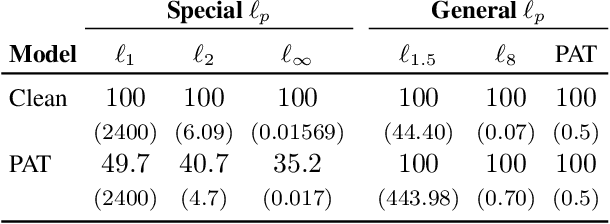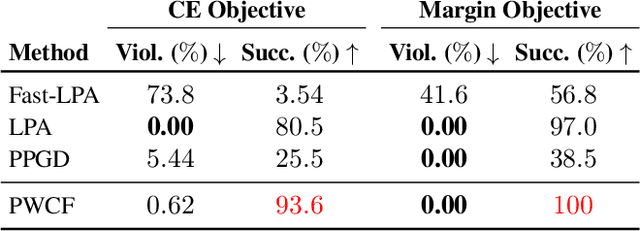Tim Mitchell
Optimization and Optimizers for Adversarial Robustness
Mar 23, 2023



Abstract:Empirical robustness evaluation (RE) of deep learning models against adversarial perturbations entails solving nontrivial constrained optimization problems. Existing numerical algorithms that are commonly used to solve them in practice predominantly rely on projected gradient, and mostly handle perturbations modeled by the $\ell_1$, $\ell_2$ and $\ell_\infty$ distances. In this paper, we introduce a novel algorithmic framework that blends a general-purpose constrained-optimization solver PyGRANSO with Constraint Folding (PWCF), which can add more reliability and generality to the state-of-the-art RE packages, e.g., AutoAttack. Regarding reliability, PWCF provides solutions with stationarity measures and feasibility tests to assess the solution quality. For generality, PWCF can handle perturbation models that are typically inaccessible to the existing projected gradient methods; the main requirement is the distance metric to be almost everywhere differentiable. Taking advantage of PWCF and other existing numerical algorithms, we further explore the distinct patterns in the solutions found for solving these optimization problems using various combinations of losses, perturbation models, and optimization algorithms. We then discuss the implications of these patterns on the current robustness evaluation and adversarial training.
NCVX: A General-Purpose Optimization Solver for Constrained Machine and Deep Learning
Oct 03, 2022Abstract:Imposing explicit constraints is relatively new but increasingly pressing in deep learning, stimulated by, e.g., trustworthy AI that performs robust optimization over complicated perturbation sets and scientific applications that need to respect physical laws and constraints. However, it can be hard to reliably solve constrained deep learning problems without optimization expertise. The existing deep learning frameworks do not admit constraints. General-purpose optimization packages can handle constraints but do not perform auto-differentiation and have trouble dealing with nonsmoothness. In this paper, we introduce a new software package called NCVX, whose initial release contains the solver PyGRANSO, a PyTorch-enabled general-purpose optimization package for constrained machine/deep learning problems, the first of its kind. NCVX inherits auto-differentiation, GPU acceleration, and tensor variables from PyTorch, and is built on freely available and widely used open-source frameworks. NCVX is available at https://ncvx.org, with detailed documentation and numerous examples from machine/deep learning and other fields.
Optimization for Robustness Evaluation beyond $\ell_p$ Metrics
Oct 02, 2022



Abstract:Empirical evaluation of deep learning models against adversarial attacks entails solving nontrivial constrained optimization problems. Popular algorithms for solving these constrained problems rely on projected gradient descent (PGD) and require careful tuning of multiple hyperparameters. Moreover, PGD can only handle $\ell_1$, $\ell_2$, and $\ell_\infty$ attack models due to the use of analytical projectors. In this paper, we introduce a novel algorithmic framework that blends a general-purpose constrained-optimization solver PyGRANSO, With Constraint-Folding (PWCF), to add reliability and generality to robustness evaluation. PWCF 1) finds good-quality solutions without the need of delicate hyperparameter tuning, and 2) can handle general attack models, e.g., general $\ell_p$ ($p \geq 0$) and perceptual attacks, which are inaccessible to PGD-based algorithms.
 Add to Chrome
Add to Chrome Add to Firefox
Add to Firefox Add to Edge
Add to Edge